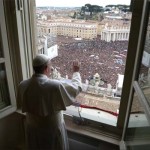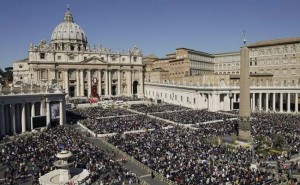 Anti-Catholic or Pro-Gospel? – article from May 06, 2014 by Tim Challies (original source thankfully, both measured and kind). One critique I heard several times was this: “You do not understand the Roman Catholic view of justification; if you understood Catholic theology you would see the pope as a defender of truth rather than an opponent of truth.” I do not wish to say that I know Catholic theology better than my Catholic friends, so I would like to try something different today.
Anti-Catholic or Pro-Gospel? – article from May 06, 2014 by Tim Challies (original source thankfully, both measured and kind). One critique I heard several times was this: “You do not understand the Roman Catholic view of justification; if you understood Catholic theology you would see the pope as a defender of truth rather than an opponent of truth.” I do not wish to say that I know Catholic theology better than my Catholic friends, so I would like to try something different today.
I believe there is a vast gulf between justification as the Bible teaches it and justification as Rome teaches it. We agree on the problem: we are sinful people who have alienated ourselves from God and are thus in need of salvation. But we disagree in very significant ways as to how sinful people can receive that salvation. The thing is, Rome believes this too. The Catholic Church understands that there is a gulf between us and they deem it every bit as serious as I do.
What I would like to do today is put aside my understanding or misunderstanding of Roman Catholic theology. Instead, let’s look at the way the Roman Catholic Church understands what I believe. What I have found is that the Roman Catholic Church understands my theology very well. Many years ago the Council of Trent closely examined the doctrine of the Protestant Reformers and responded to it with a series of canons. As they did that, they declared my faith anathema, an abomination to God. While Trent happened a long time ago, the canons have never been rescinded. Vatican II, despite its emphasis on ecumenicism, did not nullify or modify the canons of Trent (see here for an explanation from Catholic Answers).
So instead of having me explain Catholic theology and point out concerns, let’s allow Roman Catholicism to explain my Protestant view (using EWTN’s translation of the canons).
If anyone says that the sinner is justified by faith alone, meaning that nothing else is required to cooperate in order to obtain the grace of justification, and that it is not in any way necessary that he be prepared and disposed by the action of his own will, let him be anathema. (Canon 9)
I believe that the sinner is justified by faith alone, meaning that nothing else is required and nothing else needs to be cooperated with, to obtain the grace of justification. Rome understands exactly what I believe here and rejects it. (Rom 3:20-28, Eph 2:8)
If anyone says that justifying faith is nothing else than confidence in divine mercy, which remits sins for Christ’s sake, or that it is this confidence alone that justifies us, let him be anathema. (Canon 12)
I believe this! I believe that justifying faith is confidence in God’s divine mercy which remits sin for the sake of Christ and on the basis of the work of Christ. It is this—faith—and nothing else that justifies us. (Rom 3:28, John 1:12) Continue reading →


